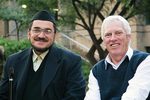Iraqi farmers benefit from research
 Agricultural Science Agricultural Science
The University of Adelaide is playing a key role in an agricultural project to improve crop production in the middle of a war zone - northern Iraq. Agronomy Chair Professor David Coventry is leading the University's participation in an Australian Centre for International Centre Research (ACIAR) project to revolutionise traditional cropping methods in Iraq. In the first project of its type in the war-torn country, researchers from three Australian organisations are helping Iraqi farmers to reduce their costs and substantially increase crop yields by eradicating cultivation and introducing zero tillage in its place. The University of Adelaide, the University of Western Australia and the Western Australian Department of Agriculture are collaborating on the project with the Ministry of Agriculture in Iraq and the International Centre for Agricultural Research in Dryland Areas (ICARDA), based in neighbouring Syria. "This has been a success story from day one," Professor Coventry said. "We have helped introduce new varieties of wheat, barley and pulses into Iraq as well as persuaded them to stop cultivating their fields and instead switch to zero tillage." Zero tillage is a method of sowing the crop now used by most Australian dryland farmers and is designed to protect the top soil that is at risk of erosion when land is extensively cultivated. "This method uses far less fuel and with more effective water use and improved soil quality, farmers achieve better productivity and higher profits," Professor Coventry said. Iraqi farmers have been crippled with a 10-fold increase in fuel and a 500% increase in fertiliser in recent years. Those who have been involved in the demonstration sites have wholeheartedly embraced the new methods. In the past decade, poor farming practices, lack of quality seed and periodic droughts in Iraq have led to soil degradation and nutrient depletion, with cereal production dropping sharply and farmers struggling to make ends meet. The first stage of the collaborative project, which began in 2004, involved Iraqi farmers in demonstration trials, facilitated by that country's Ministry of Agriculture. The Australian researchers wanted to supervise on-the-spot field visits to Iraq but with security an ongoing issue, the decision was taken to deliver the project "remotely", involving liaising with ICARDA in Syria. Stage two involves an extension of the zero tillage trials and the genetic improvement of existing seeds, with much wider participation of farmers at every level. The Iraqi project leader, Dr Abdul Sattar al Jassim from the University of Mosul, recently spent five weeks in South Australia learning about local cropping practices. Dr Sattar also spent time at the Waite, North Terrace and Roseworthy campuses, liaising with key staff and securing answers for some of the problems they have encountered with the new technology. "It is very important to use Australia's experience in cropping techniques because our climates are so similar," he said. "By involving the Iraqi farmers in actual demonstration trials, we have been able to iron out any deficiencies with machinery and refine the practices to suit our agricultural industry." Up to six Iraqi students at Masters and PhD level are expected to travel to Adelaide and Perth this year to take part in studies associated with the ACIAR project. The University is also expected to enrol up to 25 agricultural students from Iraq in a separate AusAID-funded scholarship program, announced recently by the Federal Government. Story by Candy Gibson
|





